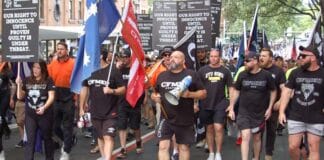Thousands of construction workers in Brisbane walked off the job today and marched on the Queensland Parliament.
The strike and rally, called by the Building Industry Group of unions (CFMEU, ETU, Plumbers Union, AMWU) followed the death of two construction workers in the last week.
One worker died on a city construction site after being ordered to work in the rain. The other was killed in an accident on a Vestas wind farm site in Dalby.
Since the CFMEU was put into administration, “The builders are more confident to do things that they shouldn’t,” one worker at the rally told Solidarity.
The strike was also aimed at the new Crisafulli LNP government’s attack on working conditions.
Crisafulli is re-establishing the Queensland Productivity Commission tasked with reviewing the construction industry. Crisafulli has also changed the right of entry rules for CFMEU health and safety officers so that 24 hours’ notice has to be given to the boss.
Outside Parliament House, thousands of workers voted to defy Crisafulli’s restriction on the right of entry, unanimously voting to stop work and sit in the sheds if any union health and safety official is denied entry to their worksite.
On 14 November the LNP Government announced that the Best Practice Industry Conditions (BPIC) agreement, negotiated with the building unions in 2018 for all state government projects over $100 million, would be suspended.
This could affect conditions on a large number of new projects from Olympic infrastructure to transport upgrades, starting in 2025.
BPIC conditions include a heat policy that allows work to stop if the temperature reaches 35 degrees, or 29 degrees and 75 per cent humidity three hours from the start of a shift, as well as a 5 per cent pay rise every year until the end of the agreement in 2027.
It also includes double time payment if it rains, up to $100 a day travel allowance for workers who live more than 50 kilometres from the site, and triple time for working over Easter and Christmas.
The heat policy was a major issue in the recent struggle for a CFMEU agreement on the Cross River Rail project, after one worker there died of heat stress late last year and more than 30 others were hospitalised.
At the front of today’s march was Jenny Newport, whose son died of heat stress in 2013 on a coal seam gas pipeline construction site near Roma; and Jess Whitton, the mother of a 17-year-old worker who died last year after a fall on a Brisbane building site.
Administration
The strike was also another blow to the Labor government’s administration of the CFMEU. Given the anger over the workplace deaths, and the attack on BPIC, the Queensland administrator didn’t dare oppose the strike.
Former CFMEU assistant secretary Jade Ingham, sacked by the administrator (and now back on the tools) was the main speaker at the rally and led the march to Parliament House.
The CFMEU’s High Court challenge to administration is being heard on 10 December. Many striking workers expressed their anger at administration.
“I think the administration is an unjust, undemocratic violation of workers’ rights,” one told Solidarity. “The government that brought it in are class traitors and they should never, ever say again that they represent workers in this country.”
“It’s not right,” another added. “The members should decide what the union is, and we don’t get a choice anymore.
“Bikies are more connected to the developers and the builders than to the CFMEU—and if there was any validity to any of those allegations, they would have faced them in a court.”
The strike in Queensland follows the NSW construction workers’ strike against administration two weeks ago.
A coordinated national mobilisation on 10 December, for the start of the High Court challenge, would put Labor and the bosses on notice. Regardless of the result of the High Court, construction workers are going to need to fight to protect their conditions and their union.
By Ian Rintoul





